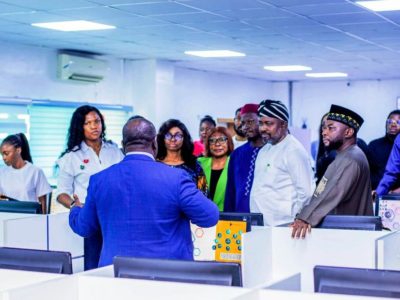NBC ignites awareness on digital migration
By MARTIN EKPEKE
With less than two years to the expiration of the June 17, 2015 migration deadline as conceived by all member countries of the International Telecommunication Union (ITU), some stakeholders in the broadcasting industry in Nigeria have expressed concerns that the country is lagging behind on the implementation from analogue to digital broadcasting. To them, preparation towards the compulsory and all important migration to digital broadcasting has been sloppy.
Digital migration brings better quality broadcast. Apart from that, there is opportunity for mixed programming for those who are interested in broadcasting. Also, the savings from the spectrum will generate money for the government amounting to $2 billion (about N380 billion) when it finally migrates from analogue to digital broadcasting. The spectrum can also be available for mobile broadband to penetrate the rural areas.
Digital migration is the process of converting TV broadcast signals from the current analogue format to digital technology. This migration became necessary as a result of developments in technology which enable more efficient use of radio frequency spectrum as well as better quality pictures and sound. Switchover from analogue to digital broadcasting creates new distribution networks and expands the potential for wireless innovation and services. Also, digital dividend accruing from efficiency in spectrum usage would allow more channels to be carried across fewer airwaves and lead to greater convergence of services.
The advantages of digital broadcasting over the analogue system is overwhelming as the value added services it brings include higher quality video and audio; greater variety and faster rates of data transmission; consistency of data flows over long distances and more spectrum efficiency, which will bring about more channels. Digital terrestrial broadcasting will also support mobile reception of video, internet and multimedia data and other services and information accessible and usable anywhere and at any time.
Though some African countries like Tanzania, Rwanda and Kenya that have tested the water experienced hitches and failures, nobody is expecting Nigeria to get it right initially but the country can learn from these countries’ mistakes. Gradually, some broadcasting organizations like GOtv and StarTimes have by default migrated to digital transmission. Even Multichioce, owner of GOtv have been using initiatives like digital mobile, where you could have your TV on your mobile phones.
But succor seems to be on the way as the National Broadcasting Commission (NBC), the regulatory body in charge of broadcasting in Nigeria called stakeholders in the broadcast industry and TV dealers to a breakfast meeting. The meeting was called to discuss the modalities involved in migrating from analogue to digital transmission. The meeting was also designed to create public awareness on the digital migration process and get the media more engaged in enlightening the masses.
Addressing the stakeholders, the Director General of the NBC, Mr. Emeka Mba said government has taken a stand on digital transmission, and from January 1, 2015 which the Nigerian government has approved before the June 17, 2015 deadline by ITU, television sets that will be sold in the country will require some level of digital compliance. “We don’t want our country to be a dumping ground for sets that are not digitally compliant,” said Mba.
Also reiterating the DG’s stance, Engr. Edward Amana, Chairman of Digiteam Nigeria, the company that is saddled with the migration processes, explained that Nigerians will be expected to buy set-top boxes at a minimum cost of N3,000 that must conform to ECOWAS standard. With the set top box, analogue TV will be able to receive digital signals.
“Our job is to midwife the migration process…setting up a standard for both setup boxes and the network… licensing manufacturers of setup boxes and integrated receivers, and then the appointment of the three carriers that will do the transmission of the signals to the people at home,” he explained.
There appears to be little or no awareness on the digital migration process even among the media which has the responsibility to educate the populace on the migration process. This is so despite government’s efforts at making sure it gets companies licensed in Nigeria to manufacture set-top boxes for sale within Nigeria and other ECOWAS space that have the same standard with Nigeria. As one stakeholder at the breakfast meet put it, “the whole essence of digital migration requires a reorientation of both the broadcasters and the general public. The way broadcasters will do their job is going to change.”
In 2006, at a Radio Communications Conference of ITU held in Geneva, member countries including Nigeria signed a resolution to achieve complete migration from analogue broadcasting to digital by the year 2015 after which there would be no more protection against interference. It is expected that all Nigerians by now should be fully aware of such a monumental change to TV viewing. What is required is that Nigerians would not by now continue to buy analogue TV receivers, which would no longer function by 2015.
As advised by Mr. Victor Gbemudu, the Assistant Comptroller General of Customs, Zone A Headquarters, Lagos, manufacturers like LG, Samsung and others should be encouraged to set up manufacturing plants in Nigeria because of the country’s market strength. “No manufacturer can ignore Nigeria in Africa.” To him, doing so will complement government’s efforts toward its transformation agenda by creating jobs that will take the youths from the street.
‘We don’t want our country to be a dumping ground for sets that are not digitally compliant’ – Mba.




























